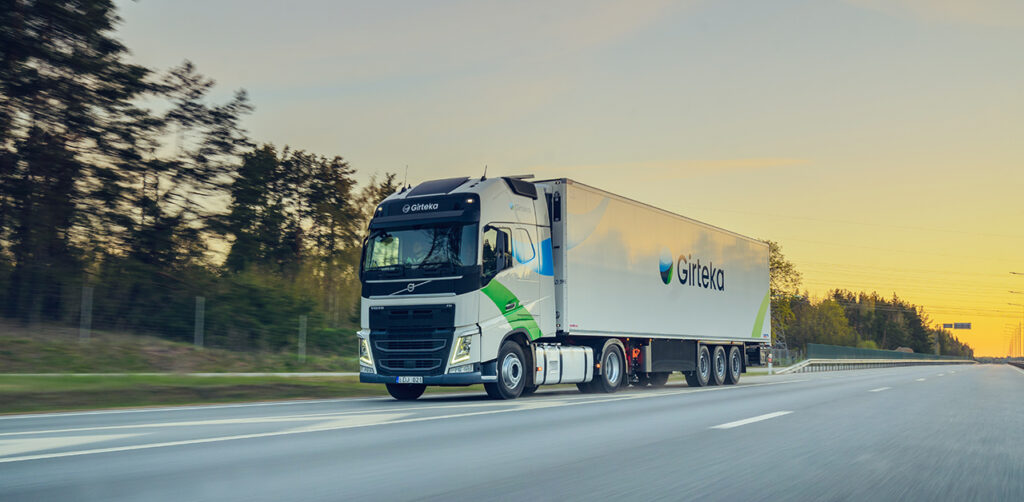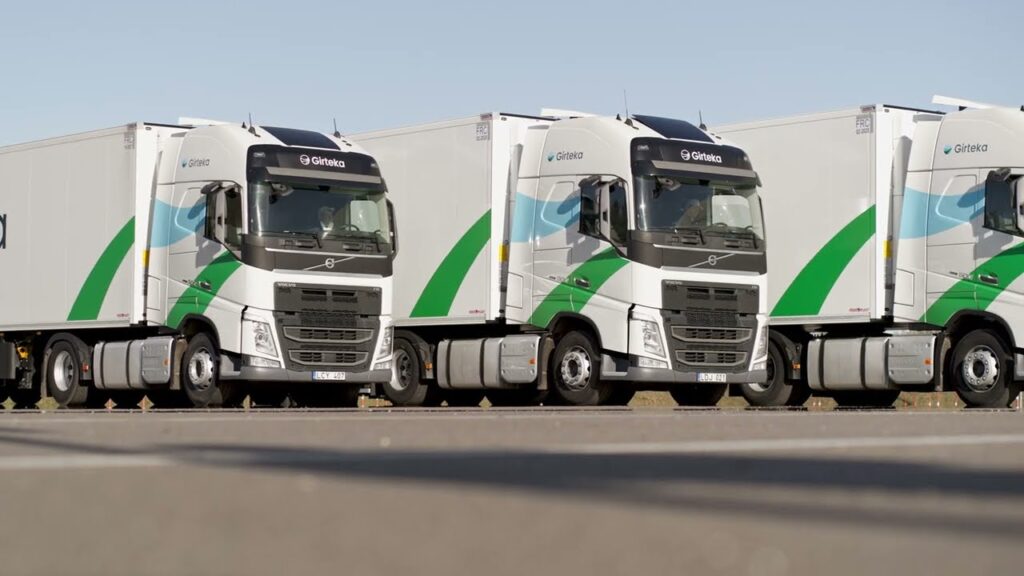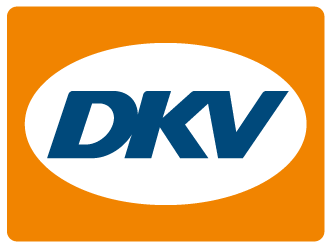We caught up with Girteka’s Tomas Šilinikas who over the past three years has spearheaded the development of the procurement function in line with Girteka’s digital logistics ambitions. Trials, tribulations, and a lot of success in between Tomas offers the detail and acknowledges the value of collaboration in achieving success.
Hi Tomas, you have spent the majority of your career in Sales. How did you end up in Procurement?
Throughout my career, I have always been drawn to new challenges and opportunities to push myself beyond my comfort zone. I’ve had the pleasure of working in a variety of industries, from the fast-paced world of commodity trading to the dynamic realm of e-commerce. Each experience has taught me valuable skills and allowed me to expand my knowledge base.
I took on the head of procurement, which has been an incredibly rewarding and stimulating experience. I’ve had the opportunity to dive deep into the intricacies of supply chain management and negotiate complex deals with suppliers from around the world. It’s been a fascinating journey so far.
But I don’t plan on stopping there. As someone who is constantly seeking out new experiences, I’m always on the lookout for the next exciting opportunity to learn and grow. Whether it’s in my professional life or personal endeavors, I’m committed to pursuing a life full of color and vibrancy. Hence my move into the Trade Marketing Director from January 2023.
Click Below: view the magazine version of this content
Typically the relationship between sales and procurement functions is not always the most cohesive. What tools and knowledge gained in previous sales based experiences do you feel have stood you in good stead for the transition into procurement?
You are right that the relationship between sales and procurement can sometimes be a bit challenging. However, I believe that my previous experience working in sales has been incredibly helpful in my transition to procurement.
One of the main advantages of having a sales background is that it has given me a deep understanding of the sales process from start to finish. I have a strong grasp of what motivates buyers and what it takes to close deals. This has been invaluable when it comes to negotiating with suppliers, as I am able to see things from their perspective and understand their needs and goals.
Additionally, my experience in sales has taught me how to effectively communicate and build relationships with clients. This skillset has translated well into procurement, as it has allowed me to build strong partnerships with suppliers and work collaboratively with them to achieve mutual goals.

Finally, I think one of the biggest advantages of having a non-procurement perspective is the ability to question and challenge existing processes and procedures. Sometimes, when you’ve been working in the same field for a long time, it can be easy to become complacent and accept things as they are. However, coming from a different background has given me a fresh perspective and a willingness to think creatively and approach problems from different angles. This has allowed me to identify inefficiencies and areas for improvement within the procurement process and implement changes that have resulted in cost savings and increased efficiency.
Overall, I believe that my sales background has given me a unique skillset that has been incredibly beneficial in my transition to procurement. It has allowed me to view processes and procedures with fresh eyes and approach problems from a different perspective, ultimately leading to more effective procurement practices.
You joined Girteka in 2020 as Head of Procurement. What did you inherit and what was the remit?
When I joined Girteka in 2020 as Head of Procurement, I was faced with the challenge of transforming a bare-bones function into a sophisticated and efficient department. The company had been operating without a strong methodology, analysis, or understanding of negotiations. It was clear that a lot of work needed to be done to create a robust procurement function.
My remit was to build a team of procurement professionals and drive transformation across the department. This meant implementing new processes, tools, and techniques to improve methodology and efficiency. One of my first tasks was to create a methodology from scratch to calculate how efficient we were in procuring fuel, ferries, and other categories compared to the market, competition, and ourselves. We also needed to establish a system for calculating tangible benefits to the company.
As Head of Procurement, I was responsible for overseeing the entire procurement process, from identifying suppliers to negotiating contracts and managing relationships. I worked closely with other departments to understand their needs and requirements and ensure that procurement was aligned with the company’s overall strategy. I also had to ensure compliance with regulatory requirements and manage risks associated with procurement activities.
To drive transformation and improve methodology, I implemented new tools and technologies to streamline processes and make them more efficient. I also invested in training and development programs for my team to ensure that they had the skills and knowledge necessary to excel in their roles. By focusing on these areas, we were able to create a strong and effective procurement function that delivered tangible benefits to the company.
Overall, my role as Head of Procurement was to drive transformation and improve methodology across the department. By building a strong team and implementing new processes and tools, we were able to create a robust procurement function that delivered real value to the company.
Girteka has operations and presence across a diverse geographical area. What are the complexities of this geography and how is procurement structured to reflect this?
Girteka has a vast geographical presence, which presents many complexities for procurement. When it comes to structuring procurement to reflect this, one of the key decisions I had to make was whether to centralize only sourcing or the entire supply chain. Given the size and diversity of the company’s operations, it quickly became clear that it would not be feasible to efficiently procure and deliver everything to stakeholders.
After careful consideration, we decided to centralise the sourcing part of the procurement process. This involved gathering demand, consolidating it, finding suitable suppliers, negotiating contracts, and controlling the execution of those contracts. By centralizing this function, we were able to achieve greater efficiency and economies of scale. It also allowed us to standardize processes and procedures, which was important for ensuring consistency and reducing risk.

To support this centralised sourcing function, we also started implementing SAP in procurement. This will help us to control and manage the operation more effectively, and to gain greater visibility into the procurement process across the entire organization.
Overall, the procurement structure at Girteka consists of a central team operating in a Competence Centre, which supports all of the company’s operations in the sourcing function. This structure allows us to achieve greater efficiency and standardisation, while also ensuring that procurement activities are aligned with the company’s overall strategy. Of course, there are still challenges associated with the company’s diverse geographical presence, including geopolitical challenges, but we are confident that our procurement structure is well-suited to handle these complexities.
Girteka is determined to drive the digital logistics agenda. Your role in driving the improved methodology and automated digital processes within the supply chain is vital. How are the ongoing transformation and subsequent implementations progressing? What other digital milestones has Girteka achieved in recent years?
One of the key ongoing transformations we are currently undertaking is the implementation of SAP, which will allow us to consolidate all our procurement data and processes into one system. This will provide us with greater visibility and control over our supply chain and help us to optimize our operations for greater efficiency and cost savings.
In addition to this, we have already achieved several digital milestones in recent years. For example, we have automated the refuelling process for our trucks using a mobile app, eliminating the need for fuel cards and streamlining the entire process. We have also implemented digital route planning, which has helped us to optimize our delivery routes and reduce our carbon footprint.
Another achievement that we are proud of is our focus on data analytics. We are constantly gathering data on our truck operations, including fuel consumption, route efficiency, and other key metrics. This allows us to analyse the data and identify areas for improvement, ultimately leading to greater efficiency and cost savings.
Overall, Girteka is committed to driving the digital logistics agenda, and we are making significant progress in this area. Our ongoing transformation and subsequent implementations are progressing well, and we are excited about the opportunities that digital technology presents for improving our supply chain methodology and delivering greater value to our customers.
Girteka’s digital ambitions and achievements do not just sit within the company, there is also a driving ambition to facilitate the supply chain in embracing these practices and in turn improve and empower the logistics sector. Why is this important to Girteka?
At Girteka, we understand that our digital ambitions and achievements can have a wider impact on the logistics sector as a whole. This is why we are committed to facilitating the adoption of digital practices and technologies within our supply chain, empowering our suppliers to improve their own operations.
There are several reasons why this is important to Girteka. Firstly, by sharing our expertise and technology with our suppliers, we can help to create a more efficient and streamlined supply chain. This can ultimately lead to cost savings for all parties involved, as well as greater sustainability and reduced environmental impact.
For example, in the future, we could explore the possibility of sharing our digital fuel card technology with our partners, allowing them to benefit from the same streamlined refuelling process that we have implemented for our own trucks. This could help to reduce administrative burdens and improve efficiency across the entire supply chain.
Secondly, by facilitating the adoption of digital practices within our supply chain, we can help to create a more level playing field for our suppliers, particularly smaller companies who may not have the resources to invest in digital technology themselves. This can help to promote fair competition and ensure that all suppliers have equal opportunities to succeed within the logistics sector.
Overall, Girteka is committed to driving digital innovation and adoption within our supply chain, and we believe that this is not only important for our own business, but for the wider logistics sector as a whole. We will continue to explore new ways to share our expertise and technology with our suppliers, and to work together to create a more efficient, sustainable, and fair logistics ecosystem.
How would you say procurement was perceived internally when you joined? Has this perception changed over time?
Over time, we have managed to change this perception and show our value to the company. By implementing strong procurement processes and methodology, we have been able to deliver significant savings to the company. We have also successfully completed several projects that have had a positive impact on the company’s bottom line. As a result, people have started to see procurement as a strategic function that plays a crucial role in the success of the company. Our consistency in delivering results has also helped change the perception of procurement from being a weak administrative function to a valuable and respected department. Overall, we have made significant progress in changing the perception of procurement within the company and we will continue to work hard to maintain this positive reputation.
Content Sponsored by DKV Mobility
How vital have creating aligned strategic partnerships with key vendors been to the overall change in how procurement performs and is perceived?
Aligning with key suppliers has been crucial to our success in procurement. By working closely with our major fuel suppliers, we have aligned our long-term visions to expand our network, set price levels, and decarbonize our operations. We also discuss the construction of new refuelling stations and what facilities they need to have for our drivers. Our IT providers and digital refuelling partners also work closely with us to align on product launches and other IT products we need.
Moreover, with ferries, it’s essential to agree on future routes, our needs on those routes, and our long-term vision. We have even gone as far as discussing chartering a ferry ship solely for our operations, but due to the war in Ukraine, those plans had to be changed. These examples show the importance of strategic partnerships with key vendors in driving success in procurement. By working together, we can ensure that our needs are met, and our operations are efficient and effective.
The logistics industry is constantly under scrutiny from a sustainability perspective. How is procurement influencing Girteka’s sustainability ambitions?
As a procurement department, we play a crucial role in facilitating communication with our suppliers to understand what they can offer and in turn, offer their solutions to our business. We also work closely with our customers to identify their needs and find ways to meet them. Our primary focus is on finding the best alternative fuels that are both environmentally sustainable and competitively priced. This helps us stay competitive in a market that is moving towards decarbonization, and we explore a range of options, including HVO, bio-LNG, bio-diesel, and more.
You joined the business at the start of 2020 and unbeknown to yourself an unprecedented time globally. What challenges did this offer and what has the trials and tribulations of the past three years taught you about yourself and Girteka?
Joining Girteka at the start of 2020 presented unique challenges due to the unexpected and unprecedented COVID-19 pandemic. As a result, there was an urgent need to quickly adapt to the new realities and ensure business continuity. We had to navigate through various challenges, such as supply chain disruptions, travel restrictions, and changes in customer demand. These challenges required us to be agile, flexible, and innovative in finding solutions.
Over the past three years, the trials and tribulations have taught me the importance of resilience and adaptability. As a procurement leader, it’s essential to stay up to date with industry trends and innovations to ensure we’re always ahead of the curve. Additionally, it has shown me the importance of having a strong team and the value of collaboration in achieving success.
Furthermore, these challenging times have demonstrated Girteka’s commitment to its employees and customers. The company was able to adapt quickly to the changes brought about by the pandemic and remained focused on delivering high-quality services to our customers. It has reinforced the company’s culture of agility, innovation, and customer-centricity, which are essential values in today’s fast-paced business environment.


